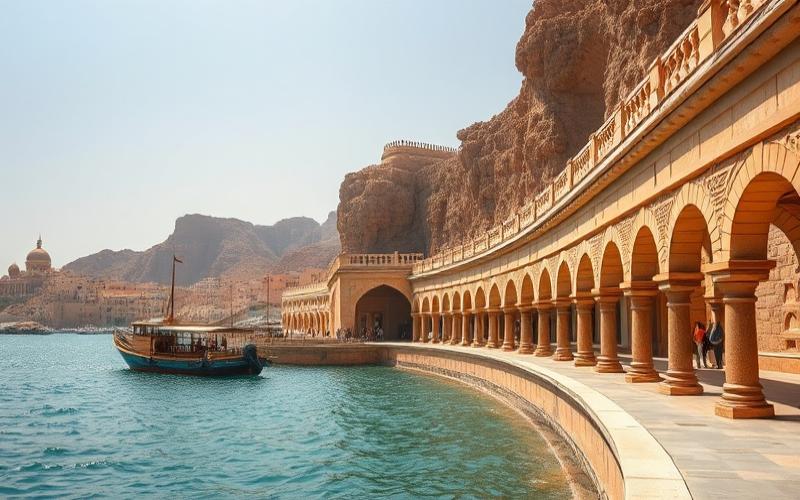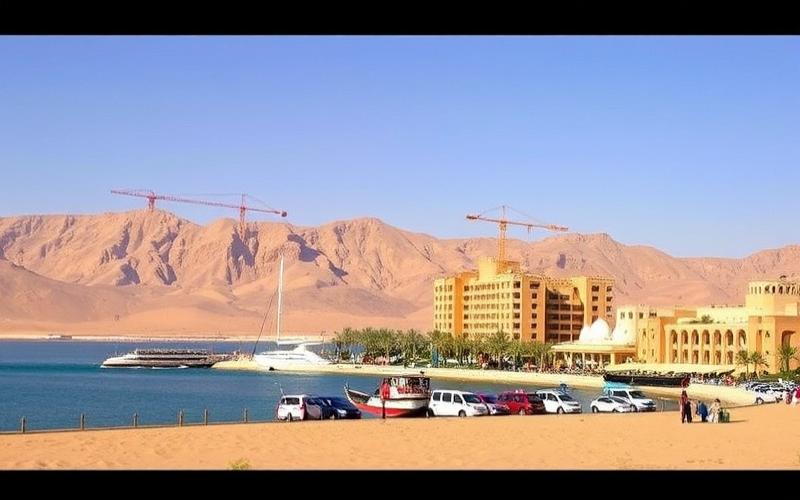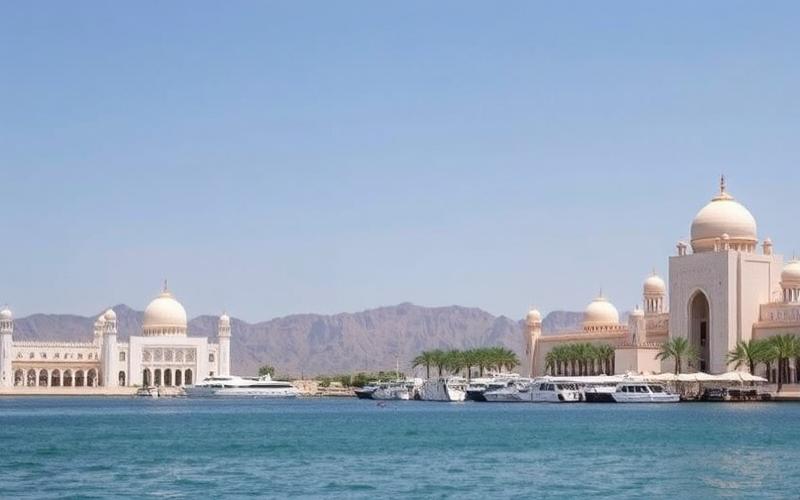
 Published on and written by Cyril Jarnias
Published on and written by Cyril Jarnias
Oman, a Middle Eastern country located on the southeastern coast of the Arabian Peninsula, is attracting more and more foreign entrepreneurs thanks to its growing economy and favorable business environment. However, before embarking on the entrepreneurial adventure in this country, it is crucial to fully understand the costs associated with company formation. This article will guide you through the various financial aspects to consider when establishing your business in Oman.
Registration Fees: The First Step of Your Entrepreneurial Adventure
Forming a company in Oman begins with its official registration with the competent authorities. This step involves several fees that are important to budget for from the start.
Trade Name Reservation Fee: Before you can register your company, you must obtain approval for your chosen trade name. This process costs approximately 20 to 30 Omani Rials (OMR).
Registration Fee with the Ministry of Commerce and Industry: Fees vary depending on the type of company you wish to establish. For an LLC (Limited Liability Company), which is the most common legal form for foreign investors, expect to pay approximately 200 to 300 OMR.
Commercial License Fee: Every business in Oman must obtain a commercial license. The cost varies according to the activity but generally ranges between 100 and 500 OMR.
Registration Fee with the Oman Chamber of Commerce and Industry (OCCI): Membership in the OCCI is mandatory, and the fees depend on the company’s capital. For a small business, expect to pay approximately 70 to 100 OMR per year.
Notary Fees: Legalization of company documents by a public notary is necessary and costs approximately 20 to 50 OMR.
Good to Know:
Registration fees may seem high at first glance, but they represent a necessary investment to operate legally in Oman. These costs vary depending on the type of activity and the chosen company structure.
Compliance Costs: Ensuring the Legality of Your Activity
Once your company is registered, you will face recurring costs to remain compliant with Omani legislation.
Annual Audit Fees: Companies in Oman are required to have their accounts audited each year by a licensed audit firm. The cost varies according to the size of the business, but for a small structure, expect between 500 and 1000 OMR per year.
Commercial License Renewal: The commercial license must be renewed annually. The fees are similar to the initial acquisition, ranging from 100 to 500 OMR depending on the activity.
Visa and Work Permit Fees: If you employ foreign workers, you will need to obtain visas and work permits. The cost per employee is approximately 200 to 300 OMR for a two-year visa.
Social Security Contributions: For Omani employees, the employer must pay a social security contribution equivalent to 11.5% of the gross salary.
Corporate Tax: Although Oman is known for its advantageous taxation, companies are subject to a 15% profit tax beyond a threshold of 30,000 OMR.
Good to Know:
Regulatory compliance is crucial in Oman. Neglecting these aspects can lead to significant fines and jeopardize the sustainability of your business. It is recommended to enlist the services of a local accounting expert to ensure all obligations are met.
Initial Investment: Preparing the Ground for Your Success
Beyond administrative fees, forming a company in Oman requires a substantial initial investment to start operations.
Minimum Share Capital: For an LLC, the minimum required share capital is 150,000 OMR (approximately $390,000). However, this amount can be reduced in some cases, particularly for small and medium-sized enterprises.
Office Rental: Prices vary considerably depending on the location. In the capital, Muscat, expect to pay between 5 and 15 OMR per square meter per month for quality office space.
Equipment and Furniture: Fitting out your premises can represent a significant investment. Budget at least 5,000 to 10,000 OMR for a small office.
IT Systems and Software: Installing a basic IT system and acquiring essential software can cost between 2,000 and 5,000 OMR.
Recruitment and Training: If you need to hire local staff, budget for recruitment and training costs. These costs can vary considerably depending on the positions to be filled.
Good to Know:
The initial investment may seem high, but it is crucial for establishing a solid foundation for your business. It is important to conduct thorough market research and a detailed business plan to accurately estimate the capital needs of your project.
Operational Expenses: Keeping Your Business Afloat
Once your company is created and operational, you will face recurring expenses to maintain your activity.
Rent and Utilities: If you rent premises, the rent will represent a significant portion of your monthly expenses. Add to that utilities (electricity, water, internet) which can be high, especially in summer due to air conditioning.
Salaries: Salaries in Oman vary by sector and skill level. For a qualified employee, expect an average monthly salary between 500 and 1500 OMR.
Marketing and Advertising: To make yourself known in the Omani market, budget for marketing. Costs can vary considerably depending on your strategy, but a minimum budget of 1000 to 2000 OMR per month is recommended for a small business.
Insurance: Various insurances are mandatory or highly recommended, including professional liability insurance. Costs vary depending on coverage and business sector.
Bank Fees: Account maintenance fees and bank commissions can represent a significant expense. Compare offers from different banks to optimize these costs.
Good to Know:
Rigorous management of operational expenses is crucial for your business’s profitability. It is recommended to implement a precise budget tracking system from the very beginning of your activity.
Cost Reduction Strategies: Optimizing Your Budget
Although the costs of forming and managing a company in Oman may seem high, there are several strategies to optimize them.
Take Advantage of Free Zones: Oman has several free zones offering tax benefits and simplified procedures. For example, the Sohar Free Zone offers a corporate tax exemption for 10 years.
Opt for Coworking: To reduce rental costs, consider coworking spaces, which are increasingly popular in Muscat. This can save you money on rent and utilities.
Outsource Certain Functions: Rather than hiring full-time staff for all functions, consider outsourcing certain tasks like accounting or marketing.
Invest in Technology: Automating certain processes can lead to long-term savings on labor costs.
Train Yourself on Local Specificities: A good understanding of the market and Omani business culture will help you avoid costly mistakes. Invest in your training and that of your employees.
Good to Know:
Cost reduction should not come at the expense of the quality of your products or services. Focus on process optimization and creating value for your customers.
Forming a company in Oman represents a significant investment, but the opportunities offered by this growing market can justify these costs. Meticulous planning, rigorous management, and a good understanding of the local business environment are essential to successfully establish yourself in this Gulf country.
Disclaimer: The information provided on this website is for informational purposes only and does not constitute financial, legal, or professional advice. We encourage you to consult qualified experts before making any investment, real estate, or expatriation decisions. Although we strive to maintain up-to-date and accurate information, we do not guarantee the completeness, accuracy, or timeliness of the proposed content. As investment and expatriation involve risks, we disclaim any liability for potential losses or damages arising from the use of this site. Your use of this site confirms your acceptance of these terms and your understanding of the associated risks.



















